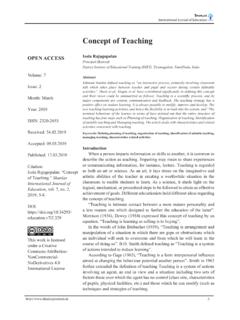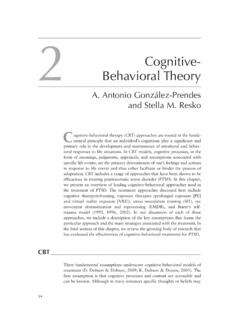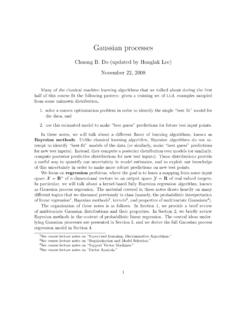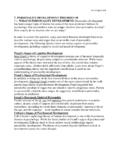Transcription of Differences of the approaches - Loreto College, St Albans
1 Social Cognitive Individual Diff Developmental Physiological Psychodynamic Behavioural Social Social approach claims that the social situation determines our behaviour. Whereas, the cog approach focuses on the metal processes behind behaviour. The individual Differences approach focuses on the difference between people gender, culture, abnormal behaviour. Social approach makes general assumptions about behaviour. The developmental approach sometimes uses the case study method. Whereas the social approach usually uses experimental research. The physiological approach explains criminal behaviour in terms of our biology genetics, brain structure etc. The social approach explains criminal behaviour in terms of the social context.
2 The psychodynamic approach explains behaviour in terms of the sex and death instinct and conflicts in the unconscious mind. Whereas the social approach focuses on the social situation. Both approaches focus on the situational context. But Behaviourism focuses on learning through conditioning . Whereas the social approach emphasises the influence others have on our behaviour. Cognitive -Both use lab experiments and studies in controlled conditions. -Both - approaches lack EV. The cognitive approach mainly uses the experimental method. Whereas, the individual approach often useS the case study method. The cognitive approach mainly uses snap-shot studies. Whereas the developmental approach often uses the longitudinal method which allows them to see how behaviour changes over time.
3 The physiological approach explains dysfunctional behaviour in terms of our biology brain structure, neurotransmitter levelS, genetics. Whereas, the cognitive approach claims that dysfunctional behaviour is a result of faulty thinking patterns. The cognitive approach uses the experimental method and carries out snap shot research. Whereas, the psychodynamic perspective mainly uses case studies that are longitudinal. The behavioural perspective claims that people learn dysfunctional behaviour through classical and operant conditioning . Whereas, the cognitive approach claims that dysfunctional behaviour is a result of faulty thinking patterns. Individual Diff -Both help us to explain Differences in behaviour.
4 - Both are based on ethnocentrism -Practical applications of research CBT and diagnosis of disorders - Useful research EWT & MPD The individual Differences approach focuses on the difference between people gender, culture. Whereas the developmental approach makes general assumptions about behaviour. Research from the physiological approach focuses on the influence of our physiology on our behaviour. Whereas, the individual Differences approach often uses a case study method that could involve research into various influences on behaviour. The individual Differences approach focuses on the difference between people gender, culture. Whereas, the psychodynamic approach makes general assumptions about behaviour all children go through the psychosexual stages.
5 The individual difference approach focuses on the Differences between people. Whereas the behavioural approach makes general assumptions about behaviour. Developmental -Both use small sample to research. -Both help to explain a great many phenomenon. - use of small samples to conduct research - useful cognitive EWT. Dev teaching of children - Both agree that childhood experience effect adulthood. -can be guilty of ethical problems. Research from the physiological approach focuses on the influence of our physiology on our behaviour. Whereas, the developmental approach considers a range of different influences on or development. The developmental approach uses scientific methods, such as experiments and objective measures.
6 Whereas the psychodynamic perspective is criticised for being unscientific Freud s interpretations are very subjective. The behaviourist perspective mainly carries out snap shot studies. Whereas the developmental approach often uses longitudinal studies. The behaviourist perspective also often uses animals. Differences of the approaches S I M I L A R I T I E S Social Cognitive Individual Diff Developmental Physiological Psychodynamic Behavioural Physiological -Both use lab experiments and studies in controlled conditions. -Both - approaches lack EV. -Both use lab experiments and studies in controlled conditions. -Both - approaches lack EV. - some practical applications to the treatment of disorders - Both assume organic cause for abnormal behaviour - Use of small samples in research.
7 - Both contribute to the nature and nurture debate. The physiological approach explains behaviour in terms of our physiology brain structure, neurotransmitter levels and genetics. Whereas, the psychodynamic perspective explains behaviour in terms o f innate drives and conflicts in our unconscious mind. The physiological approach explains behaviour in terms of our physiology brain structure, neurotransmitter levels and genetics. Whereas, the behavioural perspective claims that we learn behaviour through classical and operant conditioning . Psychodynamic -Small sample to conduct research - Both lack validity -Small sample to conduct research - Both lack validity -treatments developed for a great many disorders.
8 -ethnocentric -both assume that childhood experience effects adulthood. -Both add to the nature and nurture debate -some common ground in the development of treatments for psychological disorders. The behaviourist perspective uses the scientific approach. Whereas, the psychodynamic perspective is criticised for being unscientific. Behavioural -Both use lab experiments and studies in controlled conditions. -Both - approaches lack EV. -Both use lab experiments and studies in controlled conditions. -Both - approaches lack EV. - Development of treatments practical applications. -Use of small rare samples can effect the generalisability of research - Both are deterministic and ignore the effect of freewill on behaviour.
9 -Most studies lack generalisability. -Both use lab experiments and studies in controlled conditions. -Both - approaches lack EV. -Both based on deterministic assumptions -Both assume that human have little freewill and are driven by instincts and associations Differences of the approaches S I M I L A R I T I E S











